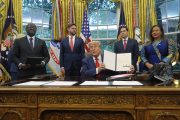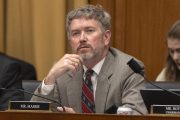
The Iraqi Parliament voted on January 5 to eliminate the U.S. troop presence in Iraq. Iraqi Prime Minister Adil Abdul Mahdi told French Foreign Minister Jean-Yves Le Drian in a phone conversation the same day that Iraqi officials were preparing a memorandum calling for the withdrawal of foreign forces.
Parliament’s vote was obviously intended as a response to the U.S. targeted airstrike on Iranian General Qasem Soleimani at Baghdad International Airport in Iraq on January 3, though it did not mention that incident. Following the escalation of tensions between the United States and Iran and the uncertainty over potential spillover throughout the region, Iraq has evidently reconsidered the presence of U.S. troops on its soil.
The resolution stated the reason for seeking the end of the U.S. presence is that ISIS has been defeated. It did not mention the killing of Soleimani. “The government commits to revoke its request for assistance from the international coalition fighting Islamic State due to the end of military operations in Iraq and the achievement of victory,” it stated.
“The Iraqi government must work to end the presence of any foreign troops on Iraqi soil and prohibit them from using its land, airspace or water for any reason.”
CNN reported that Muqtada al-Sadr, a leading Shia cleric and the head of Iraq’s largest political bloc, Saeroun, described the Iraqi Parliament’s vote as a “weak response in comparison to American violations of Iraqi sovereignty.” He called for Parliament to terminate the security agreement with the United States immediately and to close the “evil American embassy” and all American bases immediately.
CNN quoted a statement from State Department spokeswoman Morgan Ortagus, who said: “We strongly urge Iraqi leaders to reconsider the importance of the ongoing economic and security relationship between the two countries and the continued presence of the Global Coalition to Defeat ISIS. We believe it is in the shared interests of the United States and Iraq to continue fighting ISIS together.”
President Trump and U.S. military officials have blamed Soleimani and Iran-backed Iraqi militias for attacks on coalition bases in Iraq.
It is somewhat ironic that our State Department called for continuing the U.S. troop presence in Iraq to fight ISIS just after taking out Soleimani, who has been actively involved in fighting ISIS in recent years. He was a staunch supporter of the Syrian government of Bashar al-Assad and played a key role in Iran’s fight against ISIS in Iraq. He has been described as the “linchpin” bringing together Kurdish and Shia forces to fight ISIS, overseeing joint operations conducted by the two groups.
The better course of action for the United States would be to respect the wishes of Iraq’s parliament, bring all of our troops home, and let Assad, the Iranians, and the Iraqis eliminate ISIS themselves.
Photo: Rockfinder / E+ / Getty Images Plus
Related article:
Iraq Embassy Attack Illustrates Dangers of Continued Interventionism
Warren Mass has served The New American since its launch in 1985 in several capacities, including marketing, editing, and writing. Since retiring from the staff several years ago, he has been a regular contributor to the magazine. Warren writes from Texas and can be reached at [email protected].




